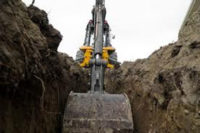 In Mississippi, the work involved gas and water lines. In Texas, sewer lines. What the two work sites had in common was that both involved trenches more than five feet deep, and neither provided its workers with protection against cave-ins.
In Mississippi, the work involved gas and water lines. In Texas, sewer lines. What the two work sites had in common was that both involved trenches more than five feet deep, and neither provided its workers with protection against cave-ins.
OSHA has cited Brocato Construction Inc. of Batesville, Miss. with two willful and one serious safety violation, after finding that workers relocating gas and water lines along a state highway were in trenches up to eight feet deep that were not guarded against collapse. The serious violation involves exposing employees to struck-by and cave-in hazards by not providing a ladder to enter and exit the excavation. Proposed penalties against Brocato total $117,600.
"An unguarded trench can collapse and bury workers beneath tons of soil and debris before they have a chance to react or escape," said Clyde Payne, OSHA's area director in Jackson. "The employer is aware of OSHA's safety standards with regard to excavation and trenching, but chose to put employees' lives at risk by having them work in an unprotected trench."
In Texas, the Hurtado Construction Co. in Richmond was issued three repeat violations after OSHA inspectors found its workers toiling in a ten-foot-deep trench that lacked required cave-in protection. Proposed penalties total $46,200.
Investigators cited the employer for failing to provide cave-in protection such as an engineered shoring system or a trench box, ensure that a competent person capable of overseeing the work is present, and ensure that piles of materials are kept away from the edge of the trench to prevent workers from being struck by falling objects. Similar violations were cited at a work site in the Del Webb residential subdivision of Richmond in September 2010.
OSHA's standards require that trenches or excavations 5 feet or deeper be protected against collapse. Information on trenching and excavation hazards is available at http://www.osha.gov/SLTC/trenchingexcavation/index.html.


